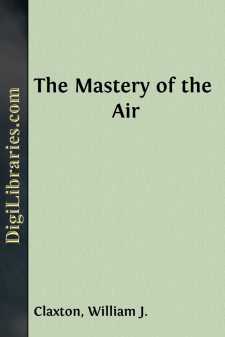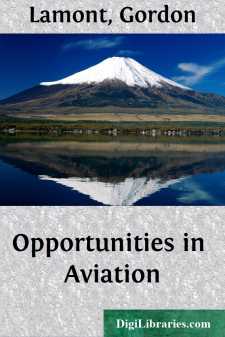Technology & Engineering
- Aeronautics & Astronautics
- Agriculture 19
- Electricity 5
- Fisheries & Aquaculture 1
- General 2
- Inventions 3
- Machinery 3
- Military Science 7
- Optics 1
- Radio 4
- Telecommunications 3
Aeronautics & Astronautics Books
Sort by:
PREFACE "Let posterity know, and knowing be astonished, that on the fifteenth day of September, 1784, Vincent Lunardi of Lucca, in Tuscany, the first aerial traveller in Britain, mounting from the Artillery Ground in London, and traversing the regions of the air for two hours and fifteen minutes, on this spot revisited the earth. In this rude monument for ages be recorded this wondrous enterprise...
more...
CHAPTER I. THE DAWN OF AERONAUTICS. "He that would learn to fly must be brought up to the constant practice of it from his youth, trying first only to use his wings as a tame goose will do, so by degrees learning to rise higher till he attain unto skill and confidence." So wrote Wilkins, Bishop of Chester, who was reckoned a man of genius and learning in the days of the Commonwealth. But so...
more...
CHAPTER I. THE INTRODUCTION OF AIRCRAFT INTO MILITARY OPERATIONS It is a curious circumstance that an invention, which is hailed as being one of the greatest achievements ever recorded in the march of civilisation, should be devoted essentially to the maiming of humanity and the destruction of property. In no other trend of human endeavour is this factor so potently demonstrated as in connection with...
more...
Introduction This report has been undertaken for a special reason. It is to explain to the taxpayer just why so many of his dollars are going into the American effort to explore space, and to indicate what he can expect in return which is of value to him. Such an explanation, even after 2 years of relatively high-geared activity in the space exploration field, appears to be warranted. There is still a...
more...
INTRODUCTORY It was at Mons in the third week of the Great War. The grey-green German hordes had overwhelmed the greater part of Belgium and were sweeping down into France whose people and military establishment were all unprepared for attack from that quarter. For days the little British army of perhaps 100,000 men, that forlorn hope which the Germans scornfully called "contemptible," but...
more...
THE FRANCO-AMERICAN CORPS It was on a cool, starlit evening, early in September, 1916, that I first met Drew of Massachusetts, and actually began my adventures as a prospective member of the Escadrille Américaine. We had sailed from New York by the same boat, had made our applications for enlistment in the Foreign Legion on the same day, without being aware of each other's existence; and in...
more...
CHAPTER I. Man's Duel with Nature Of all man's great achievements none is, perhaps, more full of human interest than are those concerned with flight. We regard ourselves as remarkable beings, and our wonderful discoveries in science and invention induce us to believe we are far and away the cleverest of all the living creatures in the great scheme of Creation. And yet in the matter of flight...
more...
THEORIES OF TUITION Only eight years ago, in 1908, it was declared impossible for one man to teach another to fly. Those few men who had risen from the ground in aeroplanes, notably the Wright brothers, were held to be endowed by nature in some very peculiar way; to be men who possessed some remarkable and hitherto unexplained sense of equilibrium. That these men would be able to take other...
more...
INTRODUCTION Since the earliest communities of human beings first struggled for supremacy and protection, the principles of warfare have remained unchanged. New methods have been evolved and adopted with the progress of science, but no discovery, save perhaps that of gunpowder, has done so much in so short a time to revolutionize the conduct of war as aviation, the youngest, yet destined perhaps to be...
more...
by:
Gordon Lamont
INTRODUCTION Any ordinary, active man, provided he has reasonably good eyesight and nerve, can fly, and fly well. If he has nerve enough to drive an automobile through the streets of a large city, and perhaps argue with a policeman on the question of speed limits, he can take himself off the ground in an airplane, and also land—a thing vastly more difficult and dangerous. We hear a great deal about...
more...











